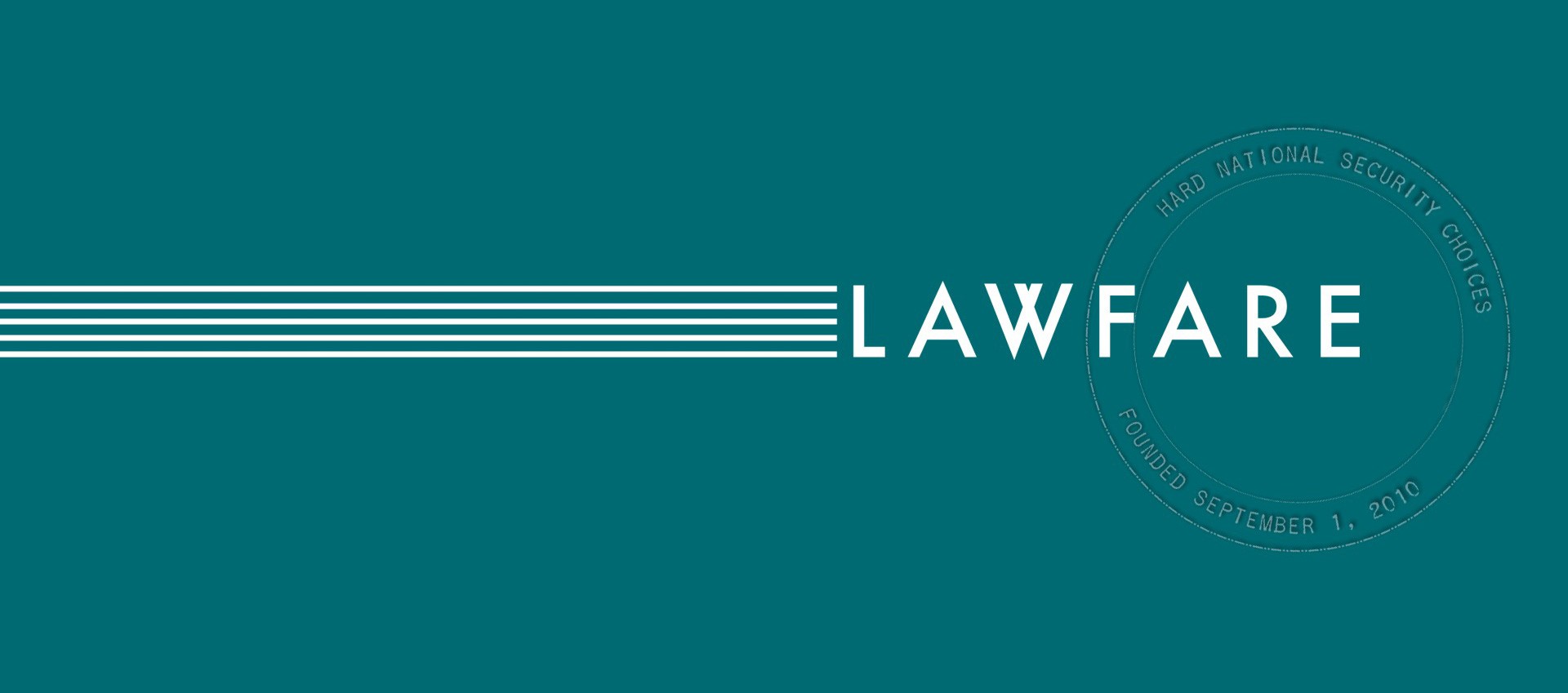The Week That Was: All of Lawfare in One Post
Your weekly summary of everything on the site.

Published by The Lawfare Institute
in Cooperation With

Trey Herr, Jenny Jun, and Emma Schroeder discussed shortcomings in language placing liability on software producers and fostering internet security in the newly released National Cybersecurity Strategy.
On the Lawfare Podcast, David Kris and Bryan Cunningham sat down with Jen Easterly to discuss her leadership of the Cybersecurity and Infrastructure Security Agency, the Biden administration’s new National Cybersecurity Strategy, emerging threats in cyberspace, and more:
Nick Nugent argued that the exclusion of certain viewpoints on the internet may be unconstitutional on the basis of public function doctrine. Nugent asserted that privately-operated social media platforms may actually constitute public spaces in which first amendment protections are enhanced, based on Marsh v. Alabama and Food Employees v. Logan Valley Plaza.
John Emmons shared the Federal Bureau of Investigation’s 2022 Internet Crime Report, which provides an overview of identified threats, the bureau’s efforts to combat cybercrime, and statistics on the state of cybercrime in the United States.
Alan Rozenshtein sat down with Orly Lobel on the Lawfare Podcast, to discuss the benefits of artificial intelligence, with insights from her new book, "The Equality Machine: Harnessing Digital Technology for a Brighter, More Inclusive Future:"
Laura Courchesne discussed the potential use of open-source end-use monitoring for military aid sent to Ukraine to address the challenges of wartime monitoring.
Paul Stephan examined the legal framework that governs foreign sovereign immunity and could facilitate seizure of assets belonging to foreign nationals with ties to the Russian government. Stephan discussed the process for redistributing confiscated assets to pay reparations to victims of Russia’s war in Ukraine.
In the latest installment of Lawfare’s foreign policy essay series, Kristof Titeca discussed Russia’s growing influence in the Democratic Republic of Congo’s security sector in context of the M23 rebellion.
Omer Duru reviewed lessons learned from U.S. allocation of military aid to Ukraine since the Russian invasion and considered how similar strategies could enhance logistical support to defend Taiwan from Chinese aggression. He focused in particular on how the proposed Taiwan Enhanced Resilience Act could facilitate Taiwanese access to modern U.S. weaponry and logistical support.
Hyemin Han shared the International Criminal Court’s statement describing arrest warrants it issued on March 17 for Russian President Vladimir Putin and Presidential Commissioner for Children’s Rights Maria Alekseyevna Lvova-Belova. The warrants are for alleged war crimes relating to the deportation of Ukrainian children during Russia’s full-scale invasion of Ukraine.
Scott R. Anderson sat down with Rachel Alpert and Alex Zerden on the Lawfare Podcast to discuss long-standing issues with humanitarian assistance in light of the Biden administration and UN Security Council’s recent move toward installing humanitarian assistance into existing sanctions regimes:
Bethany Goldblum and Andrew Reddie considered the use of wargaming in analyzing military contingencies. They argued that wargame design should entail a careful balance of artistry and science to create engaged play with relevance and accuracy to potential military contexts.
Brittan Heller and Daniel Castaño considered the implications of the use of Generative Artificial Intelligence in the legal system in light of two incidents of their use in the Colombian judicial system.
On the Lawfare Podcast, Tyler McBrien sat down with Chip Brantley and Andrew Beck Grace to discuss shortcomings in the U.S. immigration system in the context of the latest season of “White Lies,” their NPR audio documentary recounting the 1980 Mariel boatlift:
Sabina Henneberg discussed how human rights abuses—which have been largely ignored by Western governments—have compounded since 2011 to accelerate instability and political turmoil under strongman Tunisian President Kais Saied.
McBrien sat down with Eric Schmitt and Charlie Savage on the Lawfare Podcast to discuss the conflict in the Horn of Africa and the extent of U.S. military involvement in the region. They discussed the origins of the Shabab insurgency, the legal justifications presented for U.S. involvement, and why the American public and government both need to pay more attention to Somalia:
In an installment of Water Wars, Teresa Chen, Alana Nance, and Han-ah Sumner offered a survey of maritime security developments across the Indo-Pacific, including the removal of a pro-China premier in the Solomon Islands, new long-range missile tests by the Taiwanese military, Philippine President Ferdinand Marcos Jr.’s visit to Japan, and more.
McBrien interrogated the notion of popular and exclusionary foreign policy ecosystems in his review of David Allen’s newly-released book, “Every Citizen a Statesman: The Dream of a Democratic Foreign Policy in the American Century,” which presents a historical account of the now-eclipsed Foreign Policy Association.
On this week’s edition of Rational Security, Anderson, Quinta Jurecic, and Rozenshtein were joined by co-host emeritus Shane Harris to hand out some national security Academy Awards including “Best Make-Up” for the year’s most memorable apologies, “Best (non-state) Supporting Actor,” “Best Score,” and more:
And on Chatter, Harris sat down with Alyssa Rosenberg to discuss the enduring power of spy cinema, the genre’s role in helping Americans make sense of global conflict, why contemporary films are struggling to tell the story of U.S.-China great power competition, and more:
And that was the week that was.


